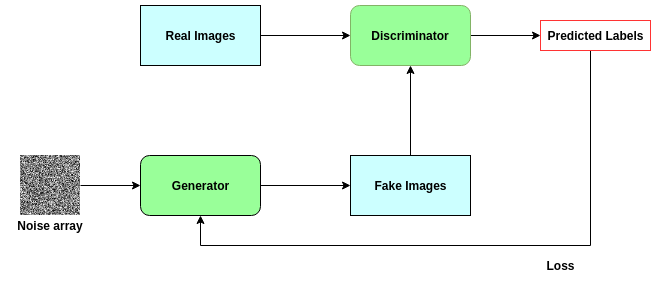
Advantages and disadvantages of generative adversarial networks (GAN)
GAN is an architecture in which two opposite networks compete with each other to generate desired data. The output of GAN include images, animation video, text, etc. The neural or opposite networks are named generative network and discriminator network. The generative network is provided with raw data to produce fake data. The fake data is then provided to the discriminator network. Real data and fake data (output from [...]
GAN is an architecture in which two opposite networks compete with each other to generate desired data. The output of GAN include images, animation video, text, etc.

The neural or opposite networks are named generative network and discriminator network.
The generative network is provided with raw data to produce fake data. The fake data is then provided to the discriminator network.
Real data and fake data (output from the generative network) are provided to the discriminator network to generate a final image or animation.
Some terms:-
- Adversarial means conflict or opposition
- Network means a deep network
Advantages of Generative Adversarial Networks (GAN’s)
- GANs generate data that looks similar to original data. If you give GAN an image then it will generate a new version of the image which looks similar to the original image. Similarly, it can generate different versions of the text, video, audio.
- GANs go into details of data and can easily interpret into different versions so it is helpful in doing machine learning work.
- By using GANs and machine learning we can easily recognize trees, street, bicyclist, person, and parked cars and also can calculate the distance between different objects.
Disadvantages of Generative Adversarial Networks (GAN’s)
- Harder to train: You need to provide different types of data continuously to check if it works accurately or not.
- Generating results from text or speech is very complex
Uses of Generative Adversarial Networks (GAN’s)
- GANs are helpful in marketing, advertisements, e-commerce, games, hospitals, etc.
- We can generate images for novels and other story writing stuff.
- GANs are mostly used in generating images and videos
Share this article
Written by : Junaid Rehman
I am a blogger and freelance web developer by profession. I love to blog and learn new things about programming and IT World.
Follow us
A quick overview of the topics covered in this article.
Latest articles
January 29, 2026
January 29, 2026
January 29, 2026
January 29, 2026
January 29, 2026









